Unit 5教案
- 格式:doc
- 大小:203.50 KB
- 文档页数:46
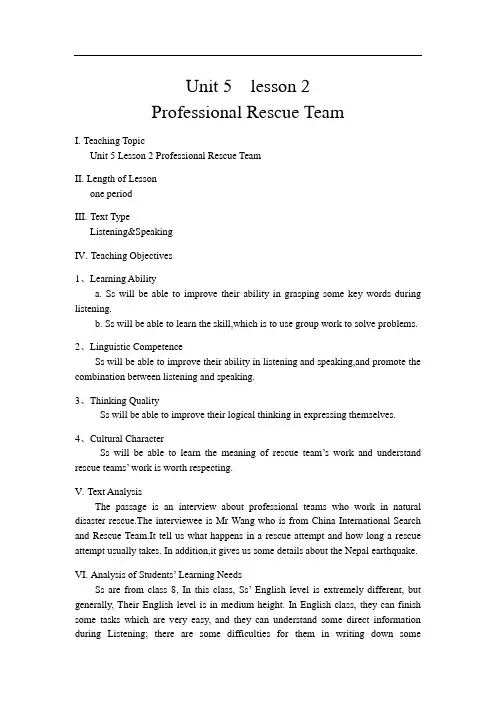
Unit 5 lesson 2Professional Rescue TeamI.Teaching TopicUnit 5 Lesson 2 Professional Rescue TeamII.Length of Lessonone periodIII.Text TypeListening&SpeakingIV.Teaching Objectives1、Learning Abilitya. Ss will be able to improve their ability in grasping some key words during listening.b. Ss will be able to learn the skill,which is to use group work to solve problems.2、Linguistic CompetenceSs will be able to improve their ability in listening and speaking,and promote the combination between listening and speaking.3、Thinking QualitySs will be able to improve their logical thinking in expressing themselves.4、Cultural CharacterSs will be able to learn the meaning of rescue team’s work and understand rescue teams’ work is worth respecting.V.Text AnalysisThe passage is an interview about professional teams who work in natural disaster rescue.The interviewee is Mr Wang who is from China International Search and Rescue Team.It tell us what happens in a rescue attempt and how long a rescue attempt usually takes. In addition,it gives us some details about the Nepal earthquake.VI.Analysis of Students’ Learning NeedsSs are from class 8, In this class, Ss’English level is extremely different, but generally, Their English level is in medium height. In English class, they can finish some tasks which are very easy, and they can understand some direct information during Listening; there are some difficulties for them in writing down someinformation and expressing themselves fluently and correctly.VII.Teaching Key PointsGrasp some factual information about professional rescue team’s workVIII.Teaching Difficult Pointsa. write down some information quickly and correctlyb. ask and answer questions in post-listening.IX.Teaching MethodPWPX.Teaching Aidstextbook, video, computer, chalksXI.Teaching Procedures1、Lead-inSs watch a video together,and answer”What disasters can you see in the video?” Then asks”What will you do in facing a natural disaster?” Let Ss know that we can ask professional rescue team for help.2、Pre-listeningBrainstorm: If you are interviewing a person who is from professional rescue team,what questions will you ask?3、While-listeninga. first listening:Listen and choose1、What happens in your rescue attempts?2、What is the difficulties in your rescue attempts?3、How long does a rescue attempt usually take?4、What is professional rescue teams' duty?b. second listening:Find your answer1、Where does Mr Wang come from?A. ChinaB. EnglandC. Nepal2、What do rescue teams look for at an earthquake site?A. moneyB. anyone who is deadC. anyone who is alive3、What do rescue teams try their best to do at an earthquake site?A. save moneyB. save alive peopleC. save dogs4、Is the rescue a tough work? Why?A. No, because they trained a lotB. Yes, because it is a battle against timeC. No,because it isn't hardinvite four students to finish these questions on the blackboardC. third listening:Listen and complete1 Our first and most important goal is to _____________.2 We use ____________________ vehicles and _____________ to look for anyone who is still alive.3 In a rescue attempt during the Nepal earthquake:. Over _____________ members and _____________ dogs took part, and we were there for ___________ days.. We rescued _____________ people and provided medical help to over _____________ people.4 It’s over duty to try to reduce _____________ and _____________.each group finish one question,and then according to two sentences let Ss learn the meaning of rescue team’s work and understand rescue teams’ workis worth respecting.4、Post-listening:Pair workWork out four questions you may ask according to the information in Activity 3. Then ask and answer the questions.divide students into different groups, then invite one group to share his answer with us.XII.Blackboard DesignstormHurricanelandslidevolcanic eruption ? your choice? Why?forest firefloodXIII.HomeworkWrite an article:When you grow up, would you like to join the professional rescue team? why?(show your main idea and use details to support your idea)XIV.Teaching Reflection。
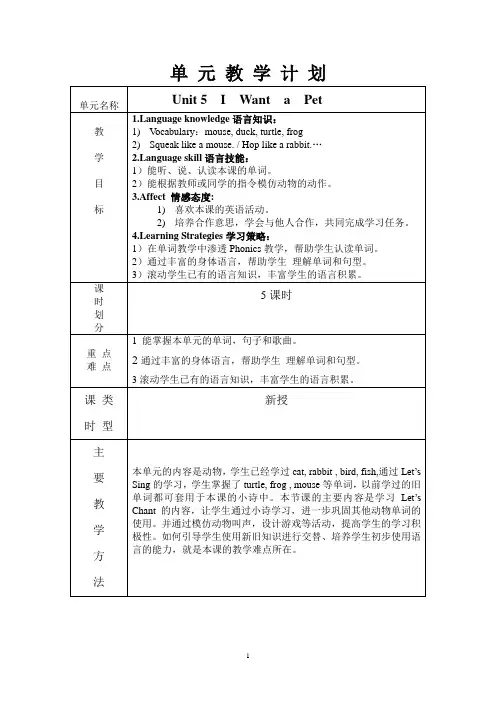
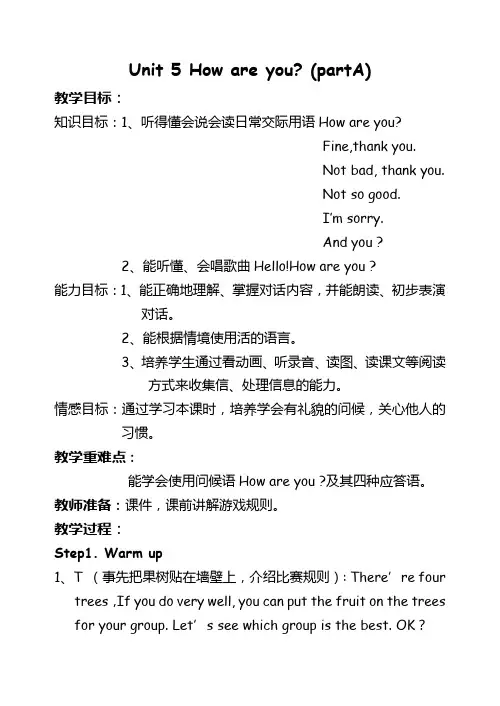
Unit 5 How are you? (partA) 教学目标: 知识目标:1、听得懂会说会读日常交际用语How are you? Fine,thank you. Not bad, thank you. Not so good. I’m sorry. And you ? 2、能听懂、会唱歌曲Hello!How are you ? 能力目标:1、能正确地理解、掌握对话内容,并能朗读、初步表演对话。 2、能根据情境使用活的语言。 3、培养学生通过看动画、听录音、读图、读课文等阅读方式来收集信、处理信息的能力。 情感目标:通过学习本课时,培养学会有礼貌的问候,关心他人的习惯。 教学重难点:
能学会使用问候语How are you ?及其四种应答语。 教师准备:课件,课前讲解游戏规则。
教学过程: Step1. Warm up 1、T (事先把果树贴在墙壁上,介绍比赛规则): There’re four trees,If you do very well, you can put the fruit on the trees for your group. Let’s see which group is the best. OK? S: OK. 2、Sing some songs: T: There are three songs. Which one do you want to choose first?Red? Blue or green? (课件展示三个不同颜色的圆,让学生自主选择) 3、Greeting. (复习前几个单元所学习日常用语) T: Class begins! S: Stand up! T: Good afternoon, boys and girls! S: Good afternoon, Miss Cao. T: Nice to meet you! S: Nice to meet you, too! Sit down, please! S: Thank you ! What’s your name ? Introduce friends T: Hello, ……. This is ……. S1: Nice to meet you. S2: Nice to meet you, too. T : We can be good friend from now . Step2.Presentation. 1、Today someother friends coming ,who are they ,look ! (出示幻灯片) Ss:Hello … 幻灯播放:hello , how are you ? Teach: How are you? Read : How are you? T: today we’ll talk about “how are you ?”(点题、板书) But , the friends are talking about what ? Let’s have a look . 2、播放动画 Ss: how are you ? 3、T: Yes, but who are they ? Now open your books , look at the pictures and find. Ss: Nancy 、YangLing 、LiuTao…… (复习前几个单元学习的人物) T:Yes, …….they are talking about” how are you” , and Mike Helen David GaoShan are asking “how are you ?” 板书 4、T:Now read the passage , find the ohter friends answer what ? 幻灯片出示“小提示”。 (1)、Ss: Fine, thank you. Teach : Fine, thank you. with body language. (出笑脸) 操练:T-S S-T S-S. Why Helen is fine. Teach :“ and you ?” Consolidation:Sing a song “how are you ?” (2)Teach: Not bad, thank you. with body language. (出微笑脸) 操练 T-S S-T S-S Consolidation:Sing a song “how are you ?”(改编) (3) Teach: Not so good. with body language. (出哭脸) I’m sorry. 操练 T-S S-T S-S Consolidation: Let’s chant.
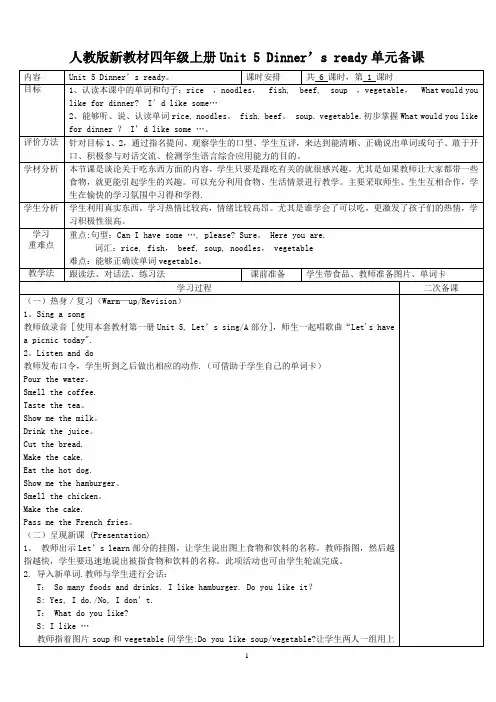
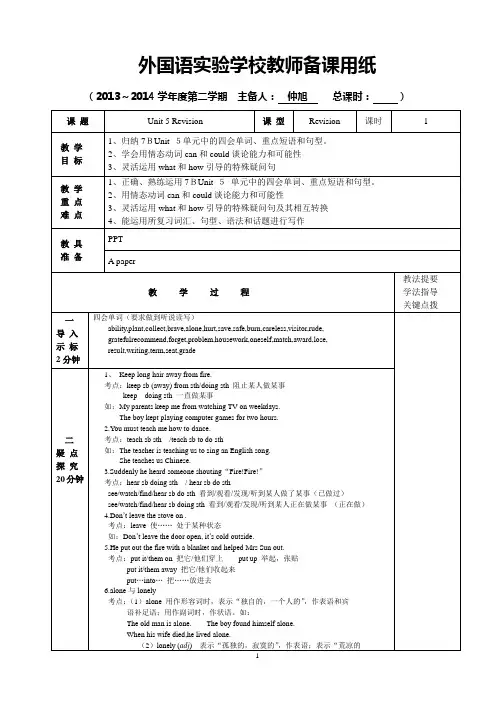
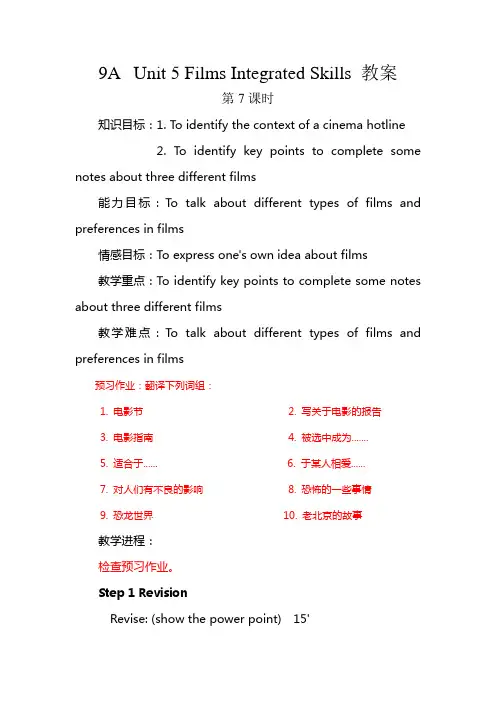
9A Unit 5 Films Integrated Skills 教案第7课时知识目标:1. To identify the context of a cinema hotline2. To identify key points to complete some notes about three different films能力目标:To talk about different types of films and preferences in films情感目标:To express one's own idea about films教学重点:To identify key points to complete some notes about three different films教学难点:To talk about different types of films and preferences in films预习作业:翻译下列词组:1. 电影节2. 写关于电影的报告3. 电影指南4. 被选中成为.......5. 适合于......6. 于某人相爱......7. 对人们有不良的影响8. 恐怖的一些事情9. 恐龙世界10. 老北京的故事教学进程:检查预习作业。
Step 1 RevisionRevise: (show the power point) 15'1. What types of films are they?①. Audrey Hepburn : Romantic filmIt’s about a young prince who met a young reporter in Roman and they fell in love with each other (fall in love with/be in love with)②.Tiger Watch: DocumentaryIt is about Asian tigers in danger.③. A murder in a country house: Horror filmIt’s about a doctor who was found in a country house.④. The end of the world: Science fiction filmWhat happened to the world because of virus?(学生活动:Watch the pictures and guess the type)Step 2. Presentation:20'1. There is a film festival in Sunshine Town, there are three films, Sandy want s to watch all of them, but She can only watch one film because she has not enough money. Here is the cinema guide. Please guess the types of the films The T ales of Old Beijing The World of Dinosaurs Love Ship2. Listen to the tape and find out the answers.(学生活动:Think and discuss.)3. Read the cinema guide and fill in the information onP92 Part A14. Sandy has read the cinema guide,so she want s to write the information about the three 's listen to the tape and finish the Part A2 on P93(学生活动:Fill in the information)5. Language points区别alive/ livingalive : adj,可以用作表语与定语T he greatest man alive keep alive/ stay aliveliving :adj Living animals He is still living.注意词性Show: vi/vtThe cinema is showing Tales of Old BeijingTales of Old Beijing is showing in the cinema.Tales of Old Beijing is show n/on in the cinema.Step 3. Exercise 10'见9A Unit 5 Films 学案Step 4. Homework1. complete some exercises on <Fedback>2. Preview speak up and study skills9A Unit 5 Films Integrated Skills学案学习目标:辞汇:书后单词表中的单词和课文中出现的词组重要句型:what do you think about fights in action films?(这是Speak up 上的一个句子,本课时并无把Speak up作为教学内容)预习案:1. 温习本单元学过的知识点和单词2. 预习Integrated skills 的新单词和讲义内容。
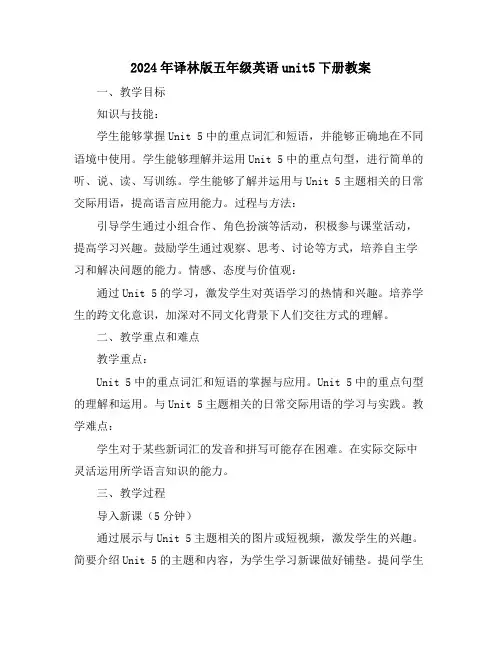
2024年译林版五年级英语unit5下册教案一、教学目标知识与技能:学生能够掌握Unit 5中的重点词汇和短语,并能够正确地在不同语境中使用。
学生能够理解并运用Unit 5中的重点句型,进行简单的听、说、读、写训练。
学生能够了解并运用与Unit 5主题相关的日常交际用语,提高语言应用能力。
过程与方法:引导学生通过小组合作、角色扮演等活动,积极参与课堂活动,提高学习兴趣。
鼓励学生通过观察、思考、讨论等方式,培养自主学习和解决问题的能力。
情感、态度与价值观:通过Unit 5的学习,激发学生对英语学习的热情和兴趣。
培养学生的跨文化意识,加深对不同文化背景下人们交往方式的理解。
二、教学重点和难点教学重点:Unit 5中的重点词汇和短语的掌握与应用。
Unit 5中的重点句型的理解和运用。
与Unit 5主题相关的日常交际用语的学习与实践。
教学难点:学生对于某些新词汇的发音和拼写可能存在困难。
在实际交际中灵活运用所学语言知识的能力。
三、教学过程导入新课(5分钟)通过展示与Unit 5主题相关的图片或短视频,激发学生的兴趣。
简要介绍Unit 5的主题和内容,为学生学习新课做好铺垫。
提问学生有关Unit 5主题的问题,引导学生思考并表达自己的观点。
词汇学习(10分钟)呈现Unit 5中的新词汇和短语,指导学生正确发音和拼写。
通过例句和图片,帮助学生理解词汇的意义和用法。
组织学生进行词汇游戏或记忆比赛,巩固所学词汇。
句型操练(10分钟)引导学生观察并总结Unit 5中的重点句型结构。
通过替换练习和模仿对话,帮助学生熟悉并掌握句型的用法。
创设真实语境,让学生运用所学句型进行实际交际练习。
课文学习(10分钟)播放课文录音或视频,让学生整体感知课文内容。
分段讲解课文,重点讲解难句和重点语法。
组织学生进行角色扮演或朗读比赛,加深对课文的理解。
文化拓展(5分钟)介绍与Unit 5主题相关的文化背景知识,拓展学生的视野。
通过对比不同国家的文化习俗,培养学生的跨文化意识。
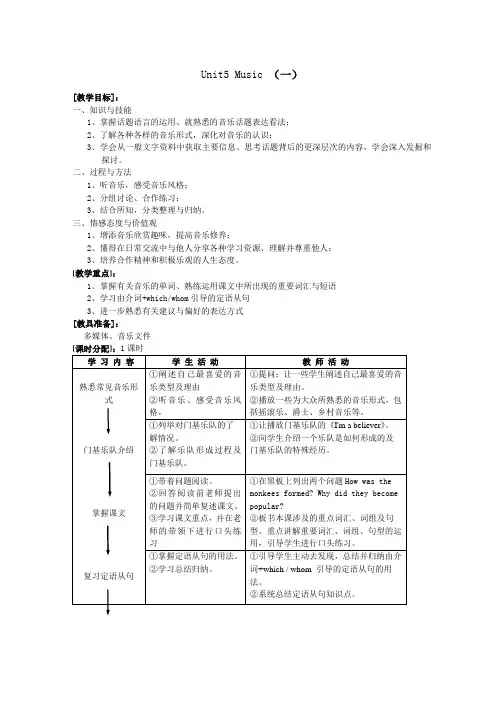
Unit5 Music (一)[教学目标]:一、知识与技能1、掌握话题语言的运用、就熟悉的音乐话题表达看法;2、了解各种各样的音乐形式,深化对音乐的认识;3、学会从一般文字资料中获取主要信息、思考话题背后的更深层次的内容,学会深入发掘和探讨。
二、过程与方法1、听音乐,感受音乐风格;2、分组讨论、合作练习;3、结合所知,分类整理与归纳。
三、情感态度与价值观1、增添音乐欣赏趣味,提高音乐修养;2、懂得在日常交流中与他人分享各种学习资源、理解并尊重他人;3、培养合作精神和积极乐观的人生态度。
[教学重点]:1、掌握有关音乐的单词、熟练运用课文中所出现的重要词汇与短语2、学习由介词+which/whom引导的定语从句3、进一步熟悉有关建议与偏好的表达方式[教具准备]:多媒体、音乐文件[引入新课]:提出问题;同学们最喜爱的音乐类型是什么?理由?[讲解词]:音乐是我们日常生活中表达喜悦、忧伤、幸福、忧愁等诸多情感的媒介,也是大家十分喜爱的艺术形式,要让大家说出自己喜爱的歌手或者音乐家我相信大家一定可以说出好多来。
今天我想和同学们探讨一下,大家平时喜爱的音乐类型,对这些音乐类型的了解和体会,我也很想听听同学们对这些音乐类型的看法,给大家讲讲为什么喜欢这种音乐类型?(选若干同学们回答)(适当总结学生所讲)同学们对所喜爱的音乐类型理由的阐述也是各有道理,所谓萝卜白菜各有所爱,每个人都有自己独特的个人喜好,对音乐类型的偏好也是如此。
也许某一天你们之中有人会成为音乐家,或者有人会成立乐队,给大家带来好听的音乐作品,丰富大家的精神生活。
[讲授新课]:一、介绍门基乐队[提出问题]:同学们有没有听过门基乐队?门基乐队有哪些作品?[学生讨论]:对门基乐队的了解。
门基乐队是一只美国本土乐队,由四人组成,于二十世纪60年代兴起,最初,乐队成员是应一则电视广告走到一起的。
主要作品有《Waiting For The Sun》、《The Unknown Soldier》、《The Soft Parade》、《Morrison Hotel》[运用教具]:播放门基乐队的《I'm a believer》给学生听,使他们亲耳感受门基乐队的风格特点。
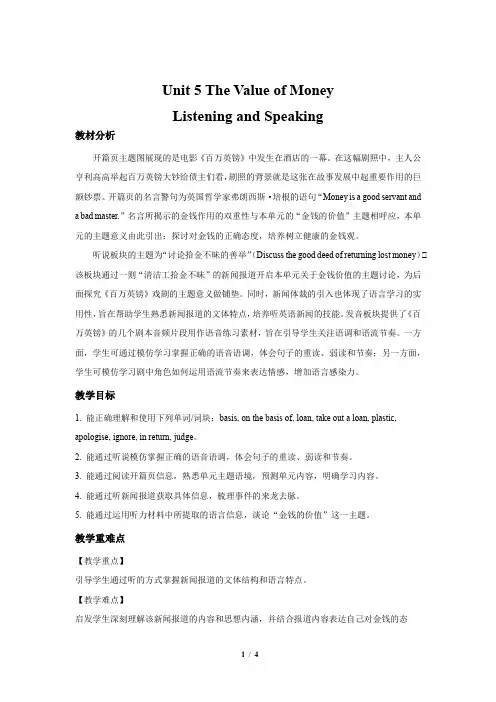
Unit 5 The Value of MoneyListening and Speaking教材分析开篇页主题图展现的是电影《百万英镑》中发生在酒店的一幕。
在这幅剧照中,主人公亨利高高举起百万英镑大钞给债主们看,剧照的背景就是这张在故事发展中起重要作用的巨额钞票。
开篇页的名言警句为英国哲学家弗朗西斯·培根的语句“Money is a good servant and a bad master.”名言所揭示的金钱作用的双重性与本单元的“金钱的价值”主题相呼应,本单元的主题意义由此引出:探讨对金钱的正确态度,培养树立健康的金钱观。
听说板块的主题为“讨论拾金不昧的善举”(Discuss the good deed of returning lost money)。
该板块通过一则“清洁工拾金不昧”的新闻报道开启本单元关于金钱价值的主题讨论,为后面探究《百万英镑》戏剧的主题意义做铺垫。
同时,新闻体裁的引入也体现了语言学习的实用性,旨在帮助学生熟悉新闻报道的文体特点,培养听英语新闻的技能。
发音板块提供了《百万英镑》的几个剧本音频片段用作语音练习素材,旨在引导学生关注语调和语流节奏。
一方面,学生可通过模仿学习掌握正确的语音语调,体会句子的重读、弱读和节奏;另一方面,学生可模仿学习剧中角色如何运用语流节奏来表达情感,增加语言感染力。
教学目标1. 能正确理解和使用下列单词/词块:basis, on the basis of, loan, take out a loan, plastic, apologise, ignore, in return, judge。
2. 能通过听说模仿掌握正确的语音语调,体会句子的重读、弱读和节奏。
3. 能通过阅读开篇页信息,熟悉单元主题语境,预测单元内容,明确学习内容。
4. 能通过听新闻报道获取具体信息,梳理事件的来龙去脉。
5. 能通过运用听力材料中所提取的语言信息,谈论“金钱的价值”这一主题。
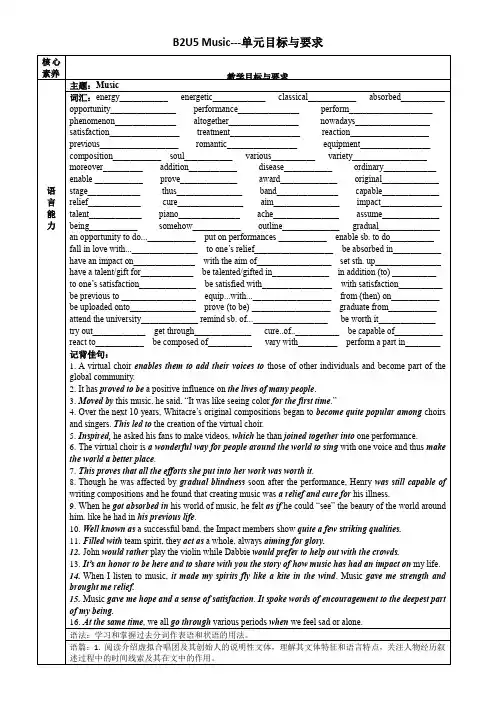
B2U5 Music---单元目标与要求语法:过去分词作表语和状语一、过去分词作表语1.过去分词可放在系动词be, get, feel, look, sound, taste, smell, remain, seem,become等之后作表语, 表示主语所处的状态。
1). He seemed quite ______________(delight) at the news.2). The door remained ____________(lock) when we arrived.2. 过去分词作表语多表示人自身的感觉、感受或事物自身的状态;现在分词作表语则多表示事物具有的特征,常译作“令人...的”。
常用的这类词有:exciting/excited; astonishing/astonished delighting/delighted moving/moved disappointing/disappointed encouraging/encouraged frightening/frightened interesting/interested3). The story they heard over the radio was very _____________(move).4). They were _____________ to hear the _______________ sound.(frighten)3. 过去分词作表语和被动语态的区别“be+过去分词”表状态时,是系表结构,此时过去分词通常已形容词化;表动作时,是被动语态,且绝大多数被动结构中的动作执行者由介词by引出。
5). 这本书写得好。
______________________________________________________________6). 这本书是鲁迅写的。
__________________________________________________________二、过去分词(短语)作状语1. 主从句主语一致,可以省略状语从句中的主语,省略的主语和动词主动关系用doing,被动关系则用done。
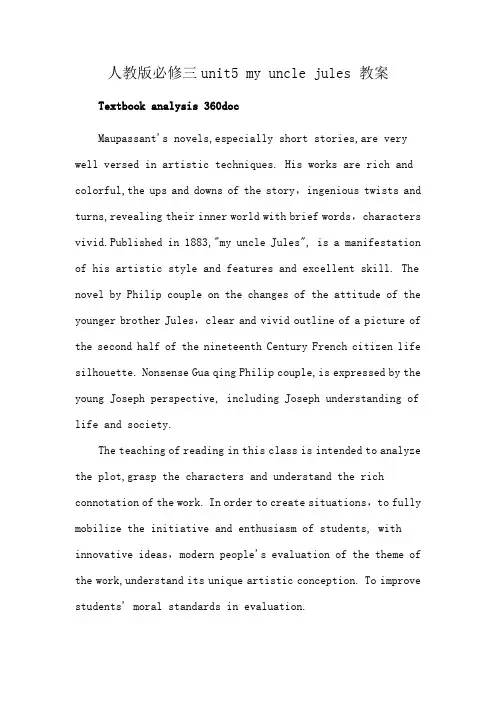
人教版必修三unit5 my uncle jules 教案Textbook analysis 360docMaupassant's novels,especially short stories,are very well versed in artistic techniques. His works are rich and colorful,the ups and downs of the story,ingenious twists and turns,revealing their inner world with brief words,characters vivid.Published in 1883,"my uncle Jules", is a manifestation of his artistic style and features and excellent skill. The novel by Philip couple on the changes of the attitude of the younger brother Jules,clear and vivid outline of a picture of the second half of the nineteenth Century French citizen life silhouette. Nonsense Gua qing Philip couple,is expressed by the young Joseph perspective, including Joseph understanding of life and society.The teaching of reading in this class is intended to analyze the plot,grasp the characters and understand the rich connotation of the work. In order to create situations,to fully mobilize the initiative and enthusiasm of students, with innovative ideas,modern people's evaluation of the theme of the work,understand its unique artistic conception. To improve students' moral standards in evaluation.Teaching targetKnowledge targetl, understand and accumulate "constraints,wealthy,white,surprised,grow with each passing day,as sure as a gun and other words.2,grasp the characters of novels and their functions.3, understanding Maupassant and his novel creation.Ability target1、learn the detailed description of the inner world of characters,and describe the characters in a personalized way.2、grasp the plot of the novel and cultivate the creative thinking of the students.3、comment on the language of the novel, improve the actual use of language ability.Emotion,attitude and valueRecognize the naked money relationship between man and society in capitalist society and raise moral values.Teaching emphasisUnderstand the text from various aspects of characterization of characters in order to show the inner worldof characters.Teaching difficultiesUnderstand the richness of the text.teaching method1, Land recitation of Maupassant's novels are succinct and lively,witty and witty. The text is excellent in the use of skills,such as the psychological description of characters,the use of suspense and the arrangement of the plot. To guide students to read aloud or read aloud by role, to analyze the language,actions and expressions of the characters to reveal the mental activities and portray the personalities of the characters on the basis of the whole grasp. Classroom teaching to read,try to dominate.2, discuss the connotation of this novel method is very rich,in the process of classroom teaching,we should create situations,activate students' thinking, active questioning,cooperative inquiry ability to explain the interpretation of the novels. For example,from the plot analysis, the author discusses the theme of the work.3, writing method in the grasp of the theme of the basic grasp characteristics of character,smooth natural end tofigure text writing, deep conception and the ups and downs of the plot narration.teaching hours2 hours。
Book 3 Unit 5 What an adventure! 教案设计单元主题本单元的主题语境是“人与自然”,涉及的主题语境内容是人类的探险活动及其意义。
本单元通过介绍历史上的著名探险家引入话题,然后通过讲述人们攀登珠峰的故事分析探险家的人格特征,引导学生思考探险的意义,继而通过科幻小说《海底两万里》的改编选段,展示了畅想中独特的海底世界及其对人类的吸引力,最终启发读者思考人与自然的关系和自我价值。
Starting out板块教学设计教学目标1.通过观察图片,匹配信息,大致了解著名的探险家、航行路线及意义。
2.大致理解视频内容,了解徐霞客的生平、经历、贡献及其影响。
Teaching ProceduresActivity 1Read the information about the three explorers. Match the routes to the explorers.Activity 2Watch the video and try to figure out the details.Xu XiakeXu Xiake was known in China as a great _____________,geographer and travel writer. Born in 1587, he loved reading booksabout geography and__________, and from an early age wished tosee the _____________________of the country.Xu started to travel at the age of 22, with the ____________ofhis mother. As well as exploring famous mountains and rivers, hewent to places that had never been visited before. His first journeys____________only a few months, so that he could return home____________. But by 1639, about two years before his death, Xuhad been travelling _______________at a time,____________almost half of modern China.__________ most travellers these days, Xu travelled the hard way -_______________. He showed great courage during his journeys. He often went without food for days, and ________ bad weather, illness, dangerous animals and even robbers. _________all these difficulties, his ________ about the natural world kept him going.Xu wrote about his ____________in his travel diaries, which are the earliest records of ____________ in Southern China. Xu's own experiences _________him to correct several mistakes in earlier books. One of his most important discoveries was that the Jinsha River was the true ________ of the Yangtze River.At more than__________ words, Xu's diaries are regarded as one of the greatest works in both scientific and literary fields. __________ into modern Chinese, it is _________ to hear the voice Xu Xiake speaking to us across the centuries about his adventures.Understanding ideas板块教学设计主题语境人与自然内容分析语篇类型为专栏文章,通过举例与引用几位探险家和心理学家说的华,分析探险家的探险“天性”和探险活动的价值。
Unit5Wildanimals教案Unit 5 Wild animalsWelcome to the unit 教案⼀、教学内容Comic strip & Welecome to the unit(第56,57页)通过两只⼩狗Eddie和Hobo的对话,引出野⽣动物的话题,学习相关野⽣动物的名字和特征,讨论最喜欢的野⽣动物。
⼆、教材分析Comic strip & Welcome to the unit 是本单元的第⼀课时,主要是激发学⽣兴趣,通过Eddie和Hobo两只⼩狗之间的对话,引出本单元的学习重点。
掌握相关野⽣动物的重要词汇和两个重要句式:Could you please not eat them? 和I may die without them.三、教学⽬标(⼀)、基础知识掌据词汇:wild free dish pity die giant panda词组:no way,have/take pity on,in fact句型:They may become dishes on the table any time.Could you please not eat them?I may die without them.(⼆)、基本技能1.复习有关动物的词汇。
狮⼦⼀lion 公⽜⼀-bull 母⽜cow ⼩⽜calf ⼭⽺-goat 绵⽺-sheep ⽺羔⼀lamb 骆驼-camel ⿅—deer ⼤象elephant 狐狸fox 长颈⿅giraffe 马⼀-horse猪pig 狗⼀-dog 猴⼦monkey 蝙蝠-bat 猫-cat 袋⿏⼀ kangaroo 兔⼦-rabbit ⽼⿏rat 鲸whale 乌龟⼀tortoise2.学习⼏种野⽣动物的英⽂名称。
海豚--dolphin 斑马⼀ zebra 松⿏squirrel ⼤熊猫⼀-giant panda 熊-bear ⽼虎⼀ tiger3.学会⽤英语谈论喜爱的野⽣动物。
七年级下册Unit 5 What do you like pandas?写作教学案(教师使用)【话题】动物园动物(Animals in a zoo)【写作目标】能运用本单元所学why ,what和where引导的特殊疑问句及语言材料,完成写作描述各种常见动物和表达自己对动物的喜爱。
【课前任务】一、写出下列短语。
1、有点2、南非3、许多4、其中之一5、处于危险中6、砍树7、迷路 8、由什么制成参考答案:1.kind of 2. South Africa 3. lots of 4.one of 5.be in danger 6.cute down 7. get lost 8. be made of二、根据汉语意思完成下列句子。
1、我的狗很聪明,它从来不会迷路。
My dog is very smart. It never _______ ________.2、海伦,别忘了给你叔叔回电话。
Helen, _______ _______ to call your uncle back.3、大卫是我最喜欢的歌手之一。
David is_______ _______ my favorite singers.4、请不要砍树。
Don’t _______ _______ trees ,please.5、这张桌子是木头做的。
The desk_______ _______ ________ wood.参考答案:1.gets lost; 2.don’t forget; 3. One of; 4.cut down; 5.is mad of三、写出与本话题有关的词汇和句型。
常用词汇:tiger, panda, lion, dog, cat, smart , cut , lazy, fun, interesting ,boring , beautiful, scary, friendly.经典句型:Why do you like…? Because they’re really cool.Where are lions from? They’re from…What animals do you like ? I like …【课中任务】读写结合一、A. 信息归纳阅读下面短文,然后按照项目要求填写所缺信息。
英语必修二unit5教案教案标题:Exploring Cultures教学目标:1. 通过本单元的学习,学生能够理解并运用与文化有关的词汇和短语。
2. 培养学生的跨文化交流能力,提高他们的文化意识和跨文化理解能力。
3. 通过阅读、听力和口语练习,提高学生的英语语言能力和综合运用能力。
教学重点:1. 掌握与文化有关的词汇和短语。
2. 培养学生的跨文化交流能力。
3. 提高学生的阅读、听力和口语表达能力。
教学难点:1. 跨文化交流的能力培养。
2. 阅读理解和听力理解的提高。
教学准备:1. 多媒体设备。
2. 学生课本、练习册和听力材料。
教学过程:Step 1: 导入新课 (5分钟)1. 向学生介绍本单元的主题:Exploring Cultures,引导学生思考不同文化之间的差异和相似之处。
2. 引入本课的话题:文化差异和文化冲突,并通过一些图片或视频展示不同国家的文化特点。
Step 2: 词汇学习 (15分钟)1. 教师通过多媒体展示与文化有关的词汇和短语,如tradition, custom, etiquette, stereotype等,并给出相应的中文解释。
2. 学生跟读并重复这些词汇和短语,教师进行适当的纠正和指导。
3. 学生进行词汇拓展练习,通过填空或选择题的方式巩固所学词汇。
Step 3: 阅读理解 (20分钟)1. 学生阅读课本中的阅读材料,了解不同国家的文化差异和冲突,并回答相关的问题。
2. 教师引导学生分析文章的结构和关键信息,帮助他们提高阅读理解能力。
3. 学生进行小组讨论,分享自己对文化差异和冲突的看法,并尝试提出解决方案。
Step 4: 听力训练 (15分钟)1. 学生听取一段关于文化冲突的对话或短文,并回答相关问题。
2. 教师播放录音并适当调整语速,帮助学生提高听力理解能力。
3. 学生进行听力复述练习,尝试用自己的话总结所听到的内容。
Step 5: 口语练习 (15分钟)1. 学生分组进行角色扮演,模拟不同文化背景下的交流场景,如在餐厅点餐或参加节日庆祝活动。
Unit 5 Music I. 单元教学目标 技能目标Goals Talk about wildlife endangerment Talk about the ways to protect wildlife Review the Present Progressive Passive Voice Write letters on how to protect rare wildlife and the environment
II. 目标语言
功 能 句 式
Asking for advice and giving advice Let’s.... What about...? What if...? What do you think...? Should we go...? If we ... Expressing your preference I prefer ... I like ... best because ... My favourite musician is ... I am fond of ... I enjoy listening to ... I don’t like ... very much 词 汇
1. 四会词汇 classical, roll, rock’n’ roll, folk, jazz, musician, clap, form, passer-by, earn, extra, play jokes on, loosely, advertisement, actor, attractive fan, instrument, hit, sort, frog, afterwards, stick, ability, perform, performance,, saying, reputation, unknown 2. 认读单词 classical, orchestra, rap, rapper, choral, Karaoke, the Monkees, reunite, supporter, Freddy, lily, feedback, Robin Spielberg, compose, Pat Conroy, grave 3. 固定词组 dream of, be honest with, play jokes on, or so, break up, by chance, sort out, stick to 4. 重点词汇 folk, dream of, be honest with, passer-by, earn, extra, sort, afterwards, stick, ability, perform, dream of, or so, break up, hit(n), by chance, above all
结 构
The Attributive Clause 1. ...bands are formed by high school students, who practise their music in someone’s home. 2. The musicians of whom the band was formed played jokes on each other .... 3. However, after a year or so in which they became more serious about their work ... 4. The guitar with which “The Beatles” played their first hit was lost while they were touring. 重 点 句 子
1. Have you ever dreamed of being in front of thousands of people at a concert with everyone clapping and enjoying your singing? 2. If we are honest with ourselves, most of us have dreamed of being famous. 3. The musicians of whom the band was formed played jokes on each other ... 4. They may play to passers-by in the street or subway so that they can earn some extra money. 5. They put an advertisement in a newspaper looking for rock musicians,... 6. However, the band broke up in about 1970, ... 7. Freddy was very confident about his singing. 8. Freddy and his band could not go out without being followed everywhere. 9. As you know, our band was formed in a very unusual way. 10. Stick to it and stay with what is true in your heart. 11. What I have in my heart must come out. 12. Make a special time for practising and stick to it. 13. Their personal life was discussed by people who did not know them but talked as if they were friends. Ⅲ. 教材分析与教材重组 1. 教材分析 本单元以music为话题,通过对本单元的教学,使学生了解有关的音乐知识,了解乐队The Monkees的形成,表演风格及发展历程,让学生在理解文章,理解音乐的同时,潜移默化培养一种审美的情趣,也会对社会生活,人的思想观,价值观以及人应该追求什么进行思考。并通过学习一个有趣的寓言故事,侧面了解演员成名后,歌迷给其带来的苦恼;暗示过分痴迷所带来的负面影响。同时让学生利用目标语言学会表达自己的观点,征询建议及把握介词提前的定语从句的使用;能利用本单元所学知识写e-mail 或短文介绍中国有关的民间音乐。 1.1 Warming up 是听八段不同的音乐,然后与书上的八幅图片相搭配,目的是通过听不同的音乐,让他们了解有关类型的音乐,讨论对于音乐的感受和喜欢听音乐的原因,激发他们对此话的兴趣,带他们进入话题 。 1.2 Pre-Reading 提出三个问题,引导学生谈论有名的乐队,尤其是与课文相关的门基合唱组。在学课文前扩展学生的思维,为学课文做好准备。 1.3 Reading 课文以知名乐队The Monkees的成立和发展为切入点,从通俗音乐的题材,特点,内容以及半个世纪来的发展历程等多个方面介绍了这种音乐艺术形式,并以音乐作为一个侧面反映了近几十年来美国社会和价值观的变化,是一篇涵盖了大量的信息量,同时又可以给学生艺术和思想双重启迪的优美文章。通俗音乐发展历史悠久,六十年代开始成为美国社会流行音乐主流,节奏强烈,主题鲜明,歌词率真,容易引发人的共鸣,尤其是在喜爱音乐的年轻人中可以产生感官和心灵上的触动。同时,流行音乐歌曲所负载的是整个社会所接受和追求的一种价值观。学习这篇课文,学生在理解文章,理解音乐的同时,潜移默化中也在培养一种审美的情趣,也会对社会生活,人的思想观,价值观以及人应该追求什么进行一定的思考。因此,作为一篇谈论音乐的文章,它提供了较广泛的教学资源拓展空间,它可以博得学生的喜爱,可以使学生有较大的热情积极投入到课堂教学中来,和教师在探究中共同学习。当然,这篇课文也有它的不足之处,由于所介绍的是早期的乐队,音乐类型和年代都离当代中国学生所接触的音乐较远,使学生需要在感性层面上接受这种音乐,导致了学生对课文的兴趣不足。 1.4 Comprehending 设计了四种题型, 第一题主要归纳乐队的特点,第二题属于细节理解题,主要加深对课文的理解,让学生学会正确理解句子。第三题是一个开放性问题,在读课文的同时,让学生去思考,让他们养成勤于动脑,善于探究的好习惯。第四题让学生归纳段意,掌握一般说明文的阅读方法,从而进一步提高他们的阅读能力。 1.5 Learning about language 部分包括词汇和语法两部分,词汇练习主要是针对课文中重点词汇的练习。其中第三题是一个开放性题,通过做游戏,一则使学生正确使用短语dream of 与to be honest with,再则激发他们的想象力,鼓励他们要有梦想,并为之而奋斗。语法主要针对定语从句介词提前的情况进行练习。 1.6 Using language包括听力和阅读两部分,通过一则幽默的寓言故事,讲了Freddy想成名及成名后的苦恼,侧面反映了歌迷不正确的崇拜方式给明星带来的负面影响。启示他们形成正确的价值观,正确地对待明星。 1.7 Speaking and writing 中Speaking 部分让学生发挥想象力,组织自己的乐队,并演奏自己喜欢的歌曲;Writing 部分让学生写出自己有关音乐的名言,目